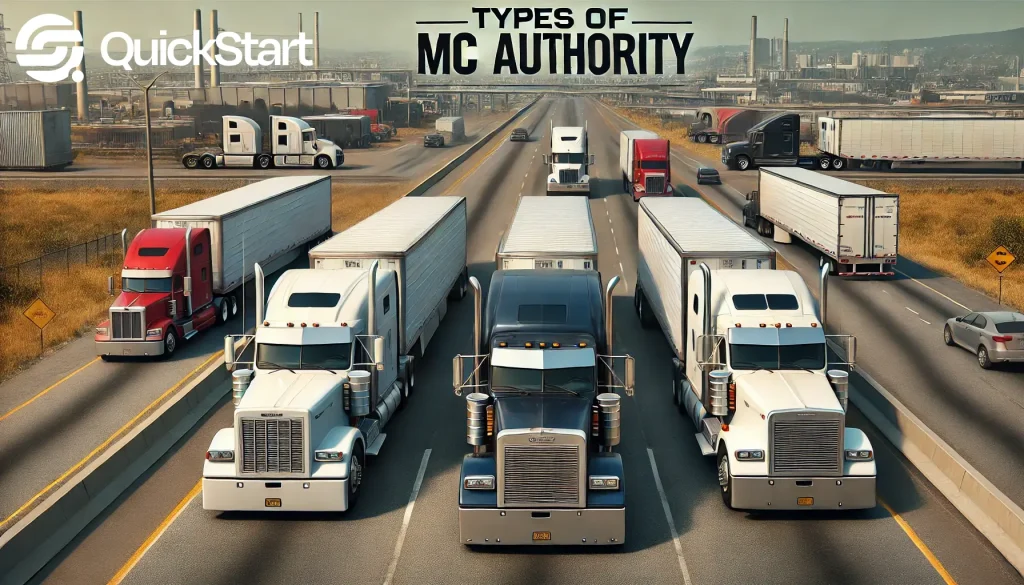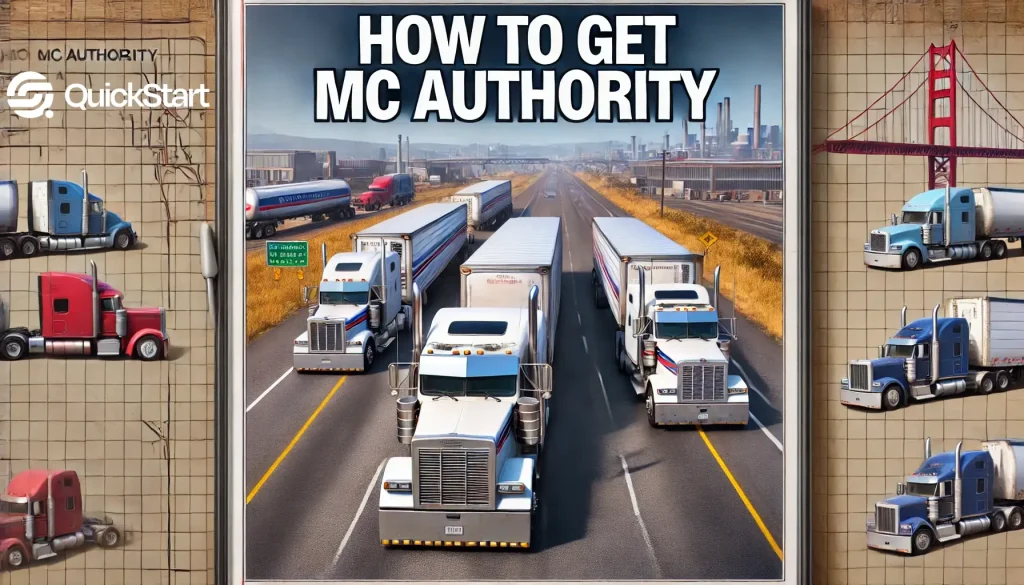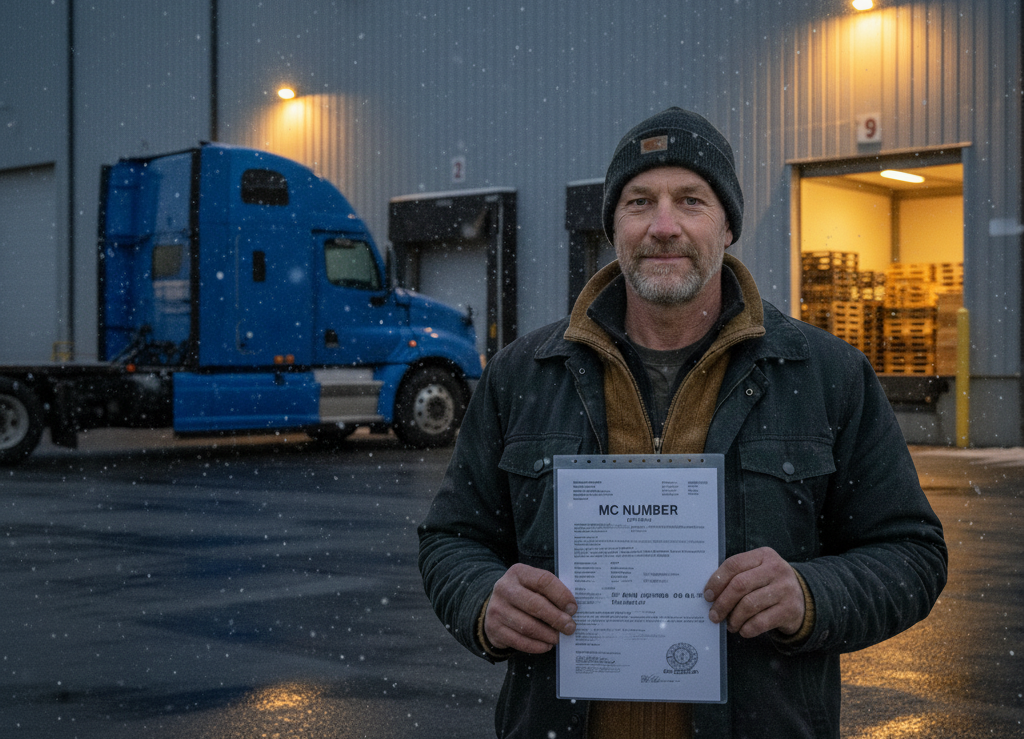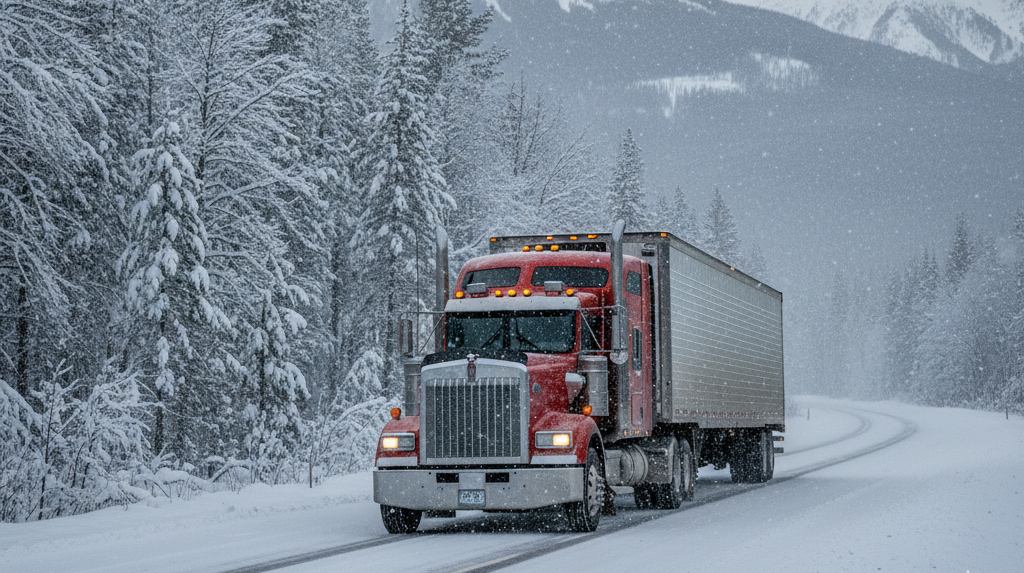What is MC Authority?
Mc Authority is a special authorization issued by the Federal Motor Carrier Safety Administration (FMCSA). It allows legal operations as a for-hire carrier transporting goods or passengers across state lines. This document is obligatory for most companies engaged that operate across multiple jurisdictions, clarifying legal rights and responsibilities.
It’s important to note that an MC number doesn’t replace a USDOT number used for tracking a company’s safety record and adherence to safety regulations.
An MC number defines the type of freight a carrier can haul and their ability to move goods across state borders. Without the proper motor carrier authority, you can face penalties and be barred from operating in severe cases. Thus, it’s essential to understand the process of obtaining an MC number and staying compliant throughout your operations.
Types of MC Authority

MC Authority can be in several types. Each of them describes the specific services you and your business provide. For a correct choice, you should understand these distinctions. Review the characteristics of each type carefully to avoid the risk of non-compliance.
Motor Carrier of Property (Except Household Goods)
Motor Carrier of Property (excluding household goods) is the most common type of own trucking authority, applying to carriers who haul general goods. This covers consumer goods, construction materials, foods, electronics, or industrial equipment.
You need this type of MC number if you ship general freight across state lines. With it, you ensure your compliance with state and federal laws.
Motor Carrier of Household Goods
This operating authority refers to logistics companies and carriers that transport household items. These items usually include personal belongings, such as furniture, clothing, appliances, and other personal items. The FMCSA requires these companies to adhere to additional regulations, such as strict insurance regulations and detailed paperwork.
Specialized MC Authorities
If carriers haul cargo that requires extra care or regulation, such as chemicals or hazardous materials, they may need specialized authorities. This involves additional measures on safety, handling, and security regulations.
Businesses applying for specialized authority must ensure they meet all compliance and training standards, as this sector of the trucking industry involves severe penalties for violations.
Who Needs an MC Authority?
Any individual driver or trucking company operating as a for-hire motor carrier must obtain an MC Authority. If you’re unsure whether your business needs motor carrier authority, you should clarify your operation type and confirm with the FMCSA.
Owner-operators. Independent truck drivers who work for themselves and transport freight across state lines.
Small and large fleets. Despite the size of a fleet you manage, you need to obtain MC Authority for interstate operations.
Freight brokers. Even if you’re not a truck driver, you must have the appropriate motor carrier authority to operate in the sector. For instance, brokers are required to obtain a freight broker authority to arrange transportation across state lines.
Carriers of regulated goods. If you haul items classified as regulated commodities, such as hazardous materials, alcohol, or chemicals, you need an MC number.
Steps to Obtain Your MC Authority

Getting your MC Authority involves a series of steps that ensure proper registration of your business, sufficient insurance, and adherence to federal regulations. You can divide the FMCSA registration process into several steps to simplify it. If it’s still challenging for you, contact QuickStart, and we’ll ensure you obtain motor carrier authority swiftly and efficiently.
Step #1: Create a Business Entity
First, you have to establish a legal business entity. You can choose a Limited Liability Company (LLC), corporation, or sole proprietorship. The choice must be based on your business structure and goals. In the case of an LLC or corporation, you can protect your personal assets from legal action or financial difficulties.
Step #2: Obtain a USDOT Number
Once you form your business entity, the next step is to obtain a USDOT number from the FMCSA. It’s a mandatory step for all motor carriers. The number tracks the safety records of your trucking company, vehicle inspections, and accident reports.
Step #3: Apply for MC Authority
Then, you can apply for your MC trucking authority. To do so, fill out the OP-1 form through the FMCSA. In the form, you must specify the type of motor carrier authority you apply for. It can be for property, household goods, passengers, etc.
After the application, you’ll obtain a docket number that will become your MC number. Usually, the FMCSA processes applications during 20-25 days. At the end of this period, you will be granted your MC Authority.
Step #4: File the BOC-3 Form
The BOC-3 form is a process of designation of a process agent for each state where you operate. A process agent acts as a legal representative and receives legal documents on behalf of your trucking company.
Step #5: File for the Unified Carrier Registration (UCR)
The Unified Carrier Registration is a federal program that requires interstate carriers to register their business annually and pay a fee based on their fleet size. This is essential for active insurance coverage and proper financial responsibility.
Step #6: Pay the Heavy Vehicle Use Tax (HVUT)
If you operate a vehicle with a gross weight of 55,000 lbs or more, you must pay the Heavy Vehicle Use Tax annually. This contributes to highway maintenance and is mandatory for heavy vehicles. The rate itself depends on the weight of your truck.
Step #7: Register for the International Registration Plan (IRP)
This step is also obligatory for businesses operating in several states. The IRP allows carriers to register their vehicles in one state while operating in multiple jurisdictions.
It also simplifies the registration, allowing it to operate with a single truck plate in multiple states.
Step #8: Set Up an International Fuel Tax Agreement (IFTA) Account
The INFTA is an agreement between US states and Canada. It simplifies fuel tax reporting for interstate carriers. With an IFTA account, you can file a single fuel tax return without dealing with the regulations of multiple jurisdictions.
Step #9: Enroll in a Drug and Alcohol Testing Program
The FMCSA requires all motor carriers to participate in a drug and alcohol testing program. This regulation aims to enhance safety on roads, preventing the risk of accidents.
The program includes pre-employment testing, random testing, post-accident testing, and follow-up testing. Non-compliance with it can lead to fines and penalties.
Costs Involved in Getting Your MC Authority
When you obtain MC trucking authority, you should pay apportioned license fees. The amount can vary depending on the size of your fleet, the states you operate in, and the type of operating authority you need.
MC Authority application fee is $300.
BOC-3 filling will cost from $10 to $50.
Unified carrier registration (UCR) fee ranges between $60 and $550, depending on the size of your fleet.
The HVUT can vary in the range of $100-550, depending on a vehicle’s weight.
The IRP fees are based on the weight of your vehicle and the states in which you operate.
Insurance costs are one of the most significant expenses. The FMCSA requires a minimum of $750,000 in liability or cargo insurance for most carriers. Sometimes, the requirement can reach $1 million or more. Thus, you must be ready to pay $5,000-10,000 annually for your insurance.
Staying Compliant After Getting MC Authority
Once you’ve obtained your motor carrier number, you should ensure constant compliance with your operations. Violations of failure to adhere to the FMCSA regulations can lead to fines, penalties, and the revocation of your operating authority.
There’s a list of common requirements for compliant operations in the trucking sector:
USDOT inspections. Every authorized motor carrier is subject to regular inspections by the FMCSA to ensure adherence to safety protocols and regulations. You must keep your vehicle in proper condition, maintain driver logs, and conduct regular inspections and maintenance activities.
BOC-3 updates. Your BOC-3 form must be accurate and up-to-date with the FMCSA. If you change your process agent or expand operations, you have to update the form.
Unified Carrier Registration renewal. You should renew your UCR annually to remain compliant with the FMCSA rules.
HVUT filing. The heavy vehicle use tax must be filed annually through the From 2290.
IFTA fuel tax reporting. You need to file quarterly reports for your IFTA account. This should include the fuel consumed in each state in which you operate during this period.
Drug and alcohol testing program. Stay enrolled in the drug and alcohol testing program to ensure all drivers of your fleet undergo regular testing.
Conclusion
Obtaining MC Authority is a significant milestone for any trucking company. Whether you ship freight, household goods, passengers, or specialized items, you need a motor carrier number for legal interstate commerce.
The process of acquiring an MC number can seem challenging. However, breaking it down into several steps can simplify it and make it more achievable. From creating a trucking business entity to paying taxes and fees, each step is essential for ensuring your compliance.
If you stay informed and proactive, you can navigate these challenges and reach success in the trucking industry, maintaining your compliance during the operations.
FAQ About MC Authority
The process usually takes 20-25 days once you submit the application to the FMCSA. This period allows a review of your application to ensure compliance with all legal requirements.
Yes. The DOT number tracks your safety record and is obligatory for all interstate motor carriers. As for the MC number, it grants you the operating authority to operate as a for-hire carrier across state lines.
You are obliged to have an MC number if you operate across multiple states or haul specific types of cargo.
Violations of regulations or failure to maintain compliance with FMCSA usually result in fines, penalties, or even suspension of your operations and the revocation of an MC Authority.




